A border story, part III: a drop in the ocean
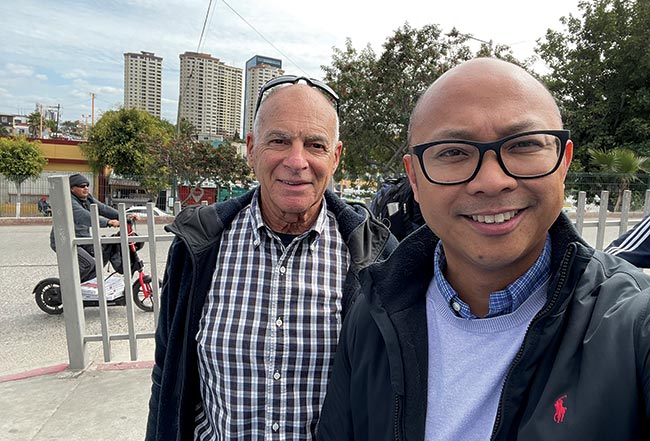
Former Claremont Deputy Director of Community Services Dave Roger, left, and City Council member Jed Leano. Photo/courtesy of Jed Leano
by Mick Rhodes | editor@claremont-courier.com
In June 2019 Jed Leano and Dave Roger made a trip to Tijuana, Mexico. Their destination was El Otro Lado, a nonprofit that provides “holistic legal and humanitarian support to refugees, deportees, and other migrants in the US and Tijuana through a multidisciplinary, client-centered, harm reduction-based practice.”
Leano, a Claremont City Council member and immigration lawyer, had heard reports of overcrowded migrant shelters in the bustling border town.
Roger, a former deputy director of community services for the City of Claremont, had been volunteering in Mexico and Central America for several years, building water systems in underserved rural communities and doing other humanitarian work.
“And then we got down there and started investigating and finding out what was going on,” Roger said.
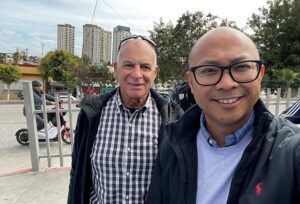
Former Claremont Deputy Director of Community Services Dave Roger, left, and City Council member Jed Leano. Photo/courtesy of Jed Leano
They learned of a migrant shelter in the foothills above Tijuana called Por amor a Dios y a los mas necesitados, una luz de esperanza, or “For the love of God and the most needy, a light of hope,” and went for a visit.
The shelter, tucked away in the foothills above the city, was teeming. Its courtyard was open to the elements, and people were sleeping in tents. Mattresses covered all available floor space. There were two small rooms, one bathroom, and a lone washing machine that churned around the clock. Residents hung their clothes to dry in an open field on a muddy slope.
“It was just overwhelming,” Roger said. “And there were only about 75 people there. But it was just overrun with people.”
Roger used the word “only” because when the Courier visited the shelter in early March of this year, there were 235 people staying there. How it grew to handle such numbers is best told by Leano and Roger.
“I really remember us going to lunch and saying, ‘What they really need are bunk beds,’” Roger recalled. “And that just started us into, well, let’s do a fundraiser to figure out how we can get some bunk beds made.”
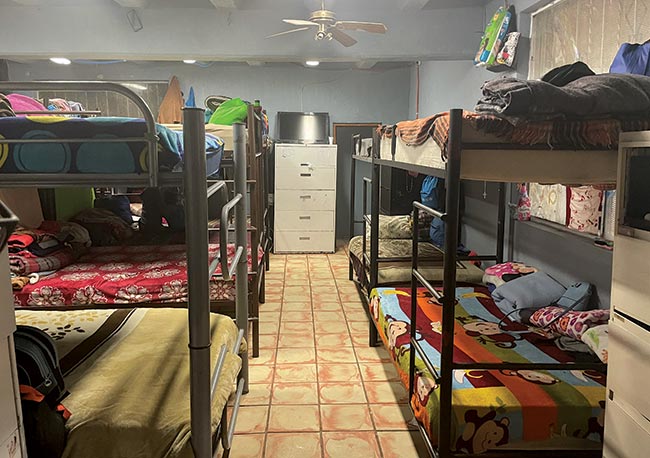
Some of the bunk beds at Por amor a Dios y a los mas necesitados, una luz de esperanza, a migrant shelter in Tijuana, Mexico. The beds were paid for through “Room for all,” a 2019 Claremont fundraising effort. Courier photo/Mick Rhodes
“It was really functionally a legal aid mission of, let’s give some advice to folks who really have no idea what they’re walking into,” Leano said. “And that is and will always be needed, but we accidentally stumbled upon the problem of the basic living conditions of people when they’re waiting.”
They called the September 8, 2019 fundraiser “Room For All,” and partnered with Claremont United Church of Christ, then Claremont High Theater Director Krista Elhai, and local theater production company Ophelia’s Jump. It was held at CHS’s Don F. Fruechte Theater and featured a production of Robert Schenkkan’s “Building the Wall.”
The goal was to raise $7,200. At the end of the night they had more than $26,000.
“And we decided to do a lot more,” Leano said.
After addressing the most critical need and having 26 bunk beds built and installed, a significant amount of money remained. So, Leano and Roger began to think bigger.
They upgraded lighting, installed fans, painted walls, bought washing machines, dryers, and kitchen utensils.
The initial plan was to install a large canopy over the open courtyard. Instead, they had contractors build a permanent structure with two new rooms and several bathrooms. Up to that point all the cooking had been being done in the courtyard on small, portable appliances and cook tops. So, they hired workers to expand a small room into a kitchen, upgrade the plumbing, electrical, and gas lines, then bought and installed a commercial-grade stove. The shelter grew from about 1,300 square feet to 3,900, and capacity had expanded to a tightly packed but well organized 250 people.
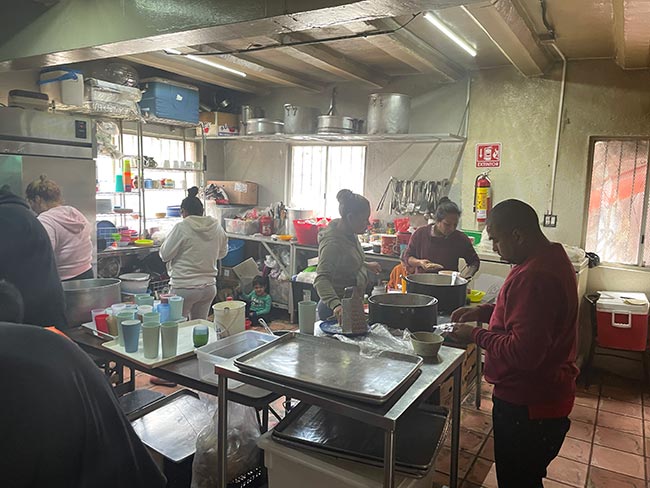
The newly expanded and updated kitchen at Por amor a Dios y a los mas necesitados, una luz de esperanza, a migrant shelter in Tijuana, Mexico, on March 6. Courier photo/Mick Rhodes
“What I really love about what we’ve accomplished here is we have made tangible, concrete, direct improvements to a very difficult humanitarian problem,” Leano said. “And every resource that we deployed was made because of the collaboration, teamwork, and the financial resources of our town. It was fundamentally our town that built those rooms, bought those beds, built those bathrooms, built that kitchen. People are housed. They have a place to eat, bathe, and sleep because of our town’s work.”
Leano and Roger returned to the shelter on a bright, brisk early March morning. Familiar faces to many, they were greeted with handshakes, hugs, and broad smiles. It was crowded. Beds and sleeping pads were packed closely together in every room, and the central courtyard served as mess hall, preschool, and social hub in the few hours we spent there. But things were tidy and efficient, and the close quarters did not dampen the palpably collaborative, cooperative vibe.
“It doesn’t say that the humanitarian crisis has been resolved, but we’ve made a major impact in the quality of people’s lives,” Leano said.
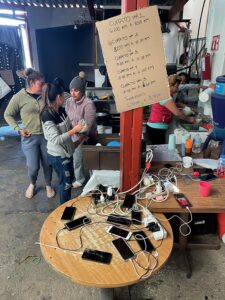
Cell phones are charged in shifts at Por amor a Dios y a los mas necesitados, una luz de esperanza, a migrant shelter in Tijuana, Mexico. Courier photo/Mick Rhodes
When they first visited in 2019, folks had come from all over, including El Salvador, Guatemala, Honduras, Nicaragua, and Mexico. Most had been driven north by the escalating violence in their countries.
“It was gangs, and I remember a lot of MS-13 stories,” Leano said. “And yeah, those organizations are involved in drug trafficking, but it was wider.”
Today the shelter is bursting at the seams, primarily with Mexicans escaping organized crime and drug cartel violence. Some described unimaginably horrific events that driven them there, some from thousands of miles away.
Nearly all the 235 people at the shelter in March were hoping for the same thing: to be granted an initial asylum screening to determine whether or not they would be allowed to make their cases to U.S. Department of Homeland Security personnel at a hearing. And despite many seemingly clear-cut cases of migrants — sometimes entire families — being in extreme physical danger, over the previous two months only a handful of the 235 people at the shelter had lucked into an interview through the only portal available, a troublesome and poorly designed smartphone app, CBP One.
“It’s so ridiculous and absurd that you have to wait that long to just ask for the processing of a duly filed immigration application,” Leano said. “It is fundamentally a legal application to say ‘I’m afraid for my life. I want to come here.’”
With so many people fleeing violence and seeking asylum, combined with a highly politicized, wildly inefficient U.S. system to process the flood of requests — one that many have argued is cruel — the situation at the Tijuana-San Ysidro border (and many of the 50 legal crossing sites along the interface between the two countries) has reached a crisis. The tragic March 27 fire at a migrant detention facility in Ciudad Juarez that killed 39 people was just the latest by-product of what some see as inhumane conditions at our southern border.
Still, even amid this combustible dynamic, the work continues to be gratifying.
“It’s hard to imagine, but yes, very much so,” Roger said.
“It’s extremely gratifying,” Leano said, “but it’s also an indictment on frankly our failed immigration policies. Every single person there is just looking for a better life and is undoubtedly escaping some very dire circumstances. And if we had more sensible immigration policies, I don’t think that this effort would be as necessary or needed.”
Roger echoed his friend’s frustration.
“It’s hard sometimes to come back without feeling pretty bummed about having met people, listened to the stories, and realizing that their hope for a future really doesn’t exist,” he said.
The “Room For All” fund, administered by Claremont United Church of Christ, remains active and is still accepting donations at claremontucc.breezechms.com/give by choosing “Room For All” from the drop-down menu.
In Part IV of this series, “Broken,” we will explore some of the fundamental flaws in our immigration policy that have in some instances exacerbated the misery at our southern border. We will also debunk a host of misconceptions about Mexican and Central American migrants seeking asylum in the U.S. Among these is the trope that immigrants are a financial drain on the U.S. economy: in fact, they are a net positive.
“One hundred percent,” Leano said. “It’s not even close. And studying the data makes that clear. Unfortunately, our policy making, like so many other areas of law, is not governed by data. It’s governed by talking points and fear and misinformation.”



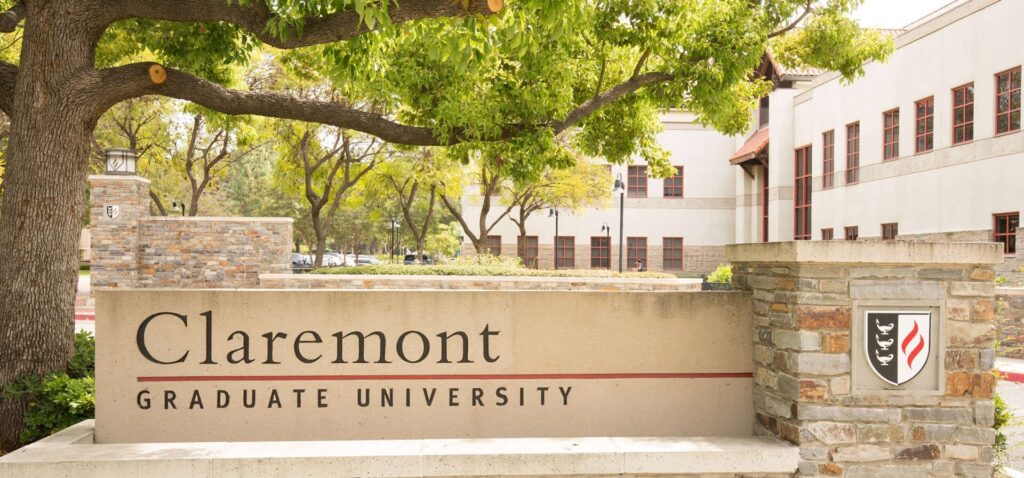






0 Comments